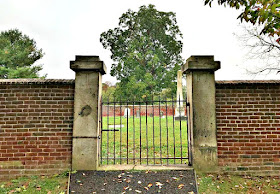 |
| Close-up of damage, probably from Union artillery, on the stone pillar at Willis Hill Cemetery. |
Like this blog on Facebook
If you know where to look, traces of the Battle of Fredericksburg may be found throughout town. There's artillery damage on
this church and on the stone pillar of infrequently visited Willis Hill Cemetery on Marye's Heights. On Dec. 13, 1862, Union artillery fire struck the cemetery, knocking down the graveyard's red-brick walls, toppling tombstones and making life hazardous for Confederate medical personnel treating wounded there. At least one Confederate regiment formed near the cemetery before it charged down the Heights to the nearby Sunken Road.
For much more on Willis Hill Cemetery, which is adjacent to the national cemetery, check out the interesting The Swale at Mercer Square blog here. The cemetery is private and not open for tours.
 |
| Entrance to Willis Hill Cemetery on Marye's Heights. War damage appears on the stone pillar at left. |
 |
| A National Park Service marker gives a brief history of Willis Hill Cemetery. |
Google Earth: Willis Hill Cemetery (near top left) is adjacent to national cemetery.
Have something to add (or correct) in this post? E-mail me here.



Is there some reason the Union could not have gone to the right of Marye's Heights and the Sunken Road? It looks like they had room between these heights and the Rappahannock river. No doubt it would have been defended, but wouldn't it have been better than to repeatedly funnel into the Sunken Road?
ReplyDeleteGeneral burnside was being pressured by Union news papers and the President for quick results. Burnside had a plan presented to Lincoln and approved by the president. So to divert from that plan and rearrange troops would of taken time and then there was also the issue of showing the president a battle strategy, getting his approval, and then just doing something completely different. Burnside knew if he lost this battle he would be replaced so he did not want to deviate from his original plan. Even though his generals begged him to do exactly what you mentioned.
Delete